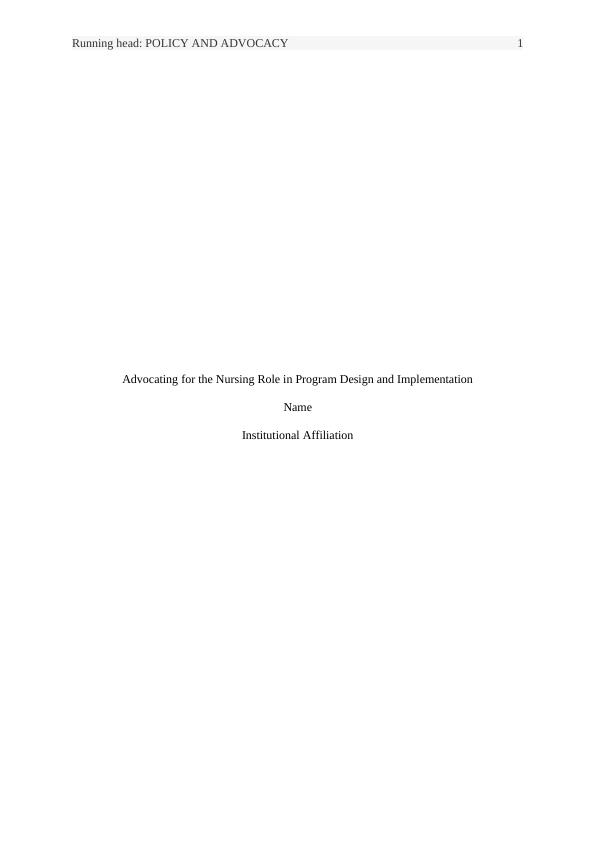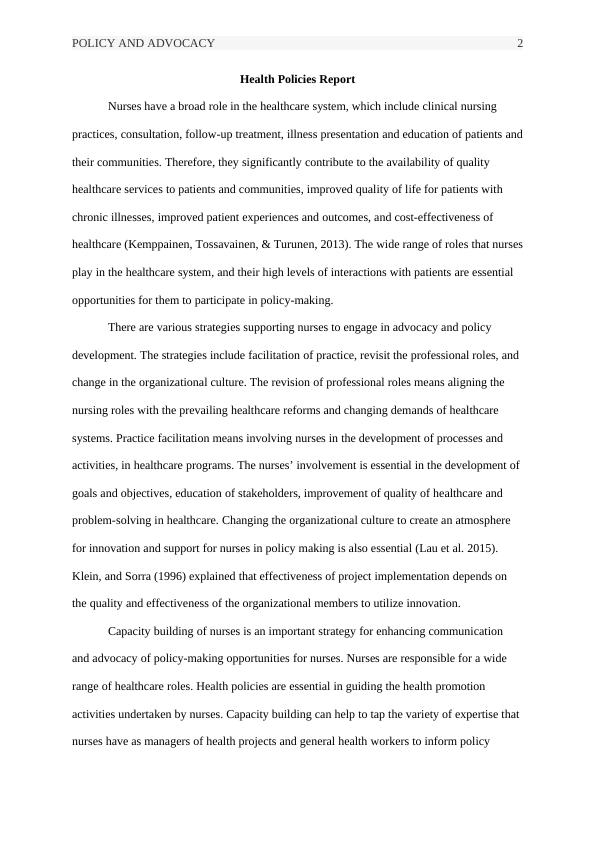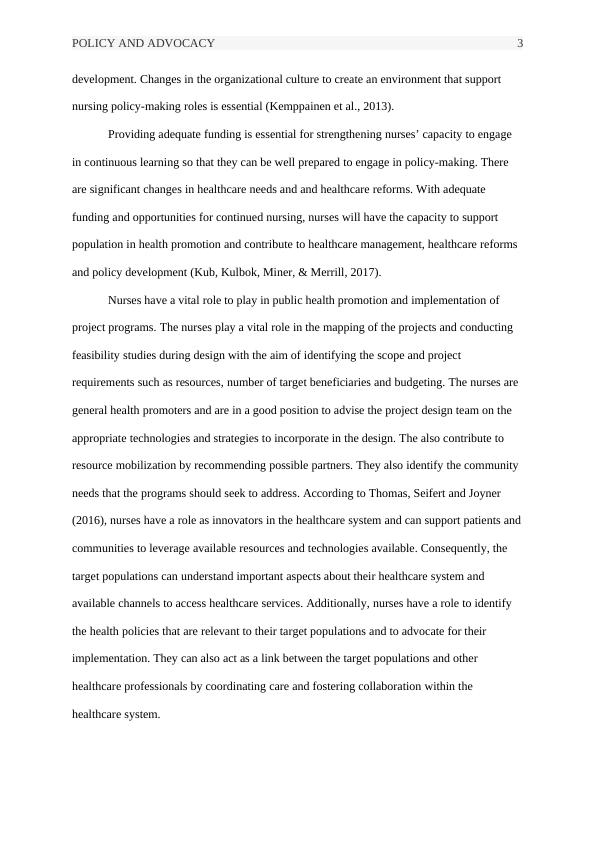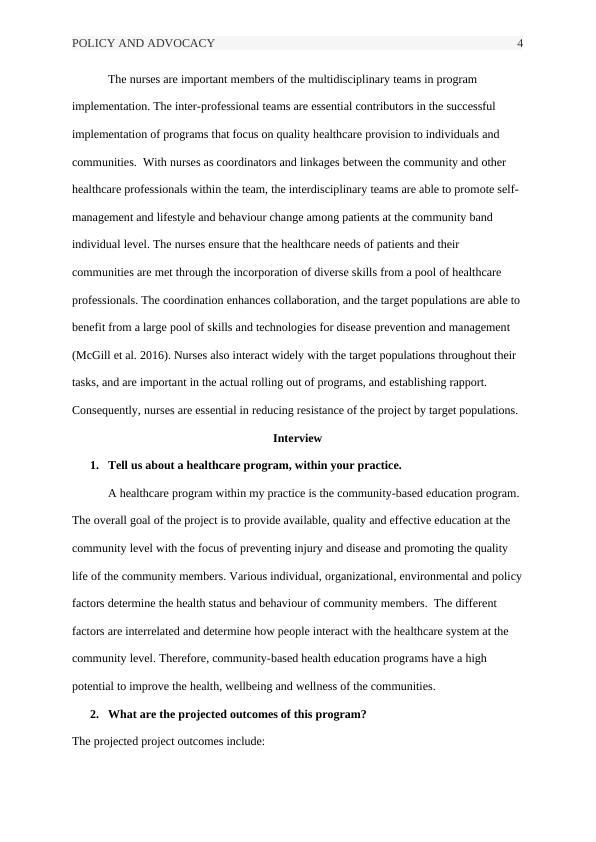Ask a question from expert
Advocating for the Nursing Role in Program Design and Implementation
11 Pages2725 Words25 Views
Added on 2022-08-20
Advocating for the Nursing Role in Program Design and Implementation
Added on 2022-08-20
BookmarkShareRelated Documents
Running head: POLICY AND ADVOCACY 1
Advocating for the Nursing Role in Program Design and Implementation
Name
Institutional Affiliation
Advocating for the Nursing Role in Program Design and Implementation
Name
Institutional Affiliation

POLICY AND ADVOCACY 2
Health Policies Report
Nurses have a broad role in the healthcare system, which include clinical nursing
practices, consultation, follow-up treatment, illness presentation and education of patients and
their communities. Therefore, they significantly contribute to the availability of quality
healthcare services to patients and communities, improved quality of life for patients with
chronic illnesses, improved patient experiences and outcomes, and cost-effectiveness of
healthcare (Kemppainen, Tossavainen, & Turunen, 2013). The wide range of roles that nurses
play in the healthcare system, and their high levels of interactions with patients are essential
opportunities for them to participate in policy-making.
There are various strategies supporting nurses to engage in advocacy and policy
development. The strategies include facilitation of practice, revisit the professional roles, and
change in the organizational culture. The revision of professional roles means aligning the
nursing roles with the prevailing healthcare reforms and changing demands of healthcare
systems. Practice facilitation means involving nurses in the development of processes and
activities, in healthcare programs. The nurses’ involvement is essential in the development of
goals and objectives, education of stakeholders, improvement of quality of healthcare and
problem-solving in healthcare. Changing the organizational culture to create an atmosphere
for innovation and support for nurses in policy making is also essential (Lau et al. 2015).
Klein, and Sorra (1996) explained that effectiveness of project implementation depends on
the quality and effectiveness of the organizational members to utilize innovation.
Capacity building of nurses is an important strategy for enhancing communication
and advocacy of policy-making opportunities for nurses. Nurses are responsible for a wide
range of healthcare roles. Health policies are essential in guiding the health promotion
activities undertaken by nurses. Capacity building can help to tap the variety of expertise that
nurses have as managers of health projects and general health workers to inform policy
Health Policies Report
Nurses have a broad role in the healthcare system, which include clinical nursing
practices, consultation, follow-up treatment, illness presentation and education of patients and
their communities. Therefore, they significantly contribute to the availability of quality
healthcare services to patients and communities, improved quality of life for patients with
chronic illnesses, improved patient experiences and outcomes, and cost-effectiveness of
healthcare (Kemppainen, Tossavainen, & Turunen, 2013). The wide range of roles that nurses
play in the healthcare system, and their high levels of interactions with patients are essential
opportunities for them to participate in policy-making.
There are various strategies supporting nurses to engage in advocacy and policy
development. The strategies include facilitation of practice, revisit the professional roles, and
change in the organizational culture. The revision of professional roles means aligning the
nursing roles with the prevailing healthcare reforms and changing demands of healthcare
systems. Practice facilitation means involving nurses in the development of processes and
activities, in healthcare programs. The nurses’ involvement is essential in the development of
goals and objectives, education of stakeholders, improvement of quality of healthcare and
problem-solving in healthcare. Changing the organizational culture to create an atmosphere
for innovation and support for nurses in policy making is also essential (Lau et al. 2015).
Klein, and Sorra (1996) explained that effectiveness of project implementation depends on
the quality and effectiveness of the organizational members to utilize innovation.
Capacity building of nurses is an important strategy for enhancing communication
and advocacy of policy-making opportunities for nurses. Nurses are responsible for a wide
range of healthcare roles. Health policies are essential in guiding the health promotion
activities undertaken by nurses. Capacity building can help to tap the variety of expertise that
nurses have as managers of health projects and general health workers to inform policy

POLICY AND ADVOCACY 3
development. Changes in the organizational culture to create an environment that support
nursing policy-making roles is essential (Kemppainen et al., 2013).
Providing adequate funding is essential for strengthening nurses’ capacity to engage
in continuous learning so that they can be well prepared to engage in policy-making. There
are significant changes in healthcare needs and and healthcare reforms. With adequate
funding and opportunities for continued nursing, nurses will have the capacity to support
population in health promotion and contribute to healthcare management, healthcare reforms
and policy development (Kub, Kulbok, Miner, & Merrill, 2017).
Nurses have a vital role to play in public health promotion and implementation of
project programs. The nurses play a vital role in the mapping of the projects and conducting
feasibility studies during design with the aim of identifying the scope and project
requirements such as resources, number of target beneficiaries and budgeting. The nurses are
general health promoters and are in a good position to advise the project design team on the
appropriate technologies and strategies to incorporate in the design. The also contribute to
resource mobilization by recommending possible partners. They also identify the community
needs that the programs should seek to address. According to Thomas, Seifert and Joyner
(2016), nurses have a role as innovators in the healthcare system and can support patients and
communities to leverage available resources and technologies available. Consequently, the
target populations can understand important aspects about their healthcare system and
available channels to access healthcare services. Additionally, nurses have a role to identify
the health policies that are relevant to their target populations and to advocate for their
implementation. They can also act as a link between the target populations and other
healthcare professionals by coordinating care and fostering collaboration within the
healthcare system.
development. Changes in the organizational culture to create an environment that support
nursing policy-making roles is essential (Kemppainen et al., 2013).
Providing adequate funding is essential for strengthening nurses’ capacity to engage
in continuous learning so that they can be well prepared to engage in policy-making. There
are significant changes in healthcare needs and and healthcare reforms. With adequate
funding and opportunities for continued nursing, nurses will have the capacity to support
population in health promotion and contribute to healthcare management, healthcare reforms
and policy development (Kub, Kulbok, Miner, & Merrill, 2017).
Nurses have a vital role to play in public health promotion and implementation of
project programs. The nurses play a vital role in the mapping of the projects and conducting
feasibility studies during design with the aim of identifying the scope and project
requirements such as resources, number of target beneficiaries and budgeting. The nurses are
general health promoters and are in a good position to advise the project design team on the
appropriate technologies and strategies to incorporate in the design. The also contribute to
resource mobilization by recommending possible partners. They also identify the community
needs that the programs should seek to address. According to Thomas, Seifert and Joyner
(2016), nurses have a role as innovators in the healthcare system and can support patients and
communities to leverage available resources and technologies available. Consequently, the
target populations can understand important aspects about their healthcare system and
available channels to access healthcare services. Additionally, nurses have a role to identify
the health policies that are relevant to their target populations and to advocate for their
implementation. They can also act as a link between the target populations and other
healthcare professionals by coordinating care and fostering collaboration within the
healthcare system.

POLICY AND ADVOCACY 4
The nurses are important members of the multidisciplinary teams in program
implementation. The inter-professional teams are essential contributors in the successful
implementation of programs that focus on quality healthcare provision to individuals and
communities. With nurses as coordinators and linkages between the community and other
healthcare professionals within the team, the interdisciplinary teams are able to promote self-
management and lifestyle and behaviour change among patients at the community band
individual level. The nurses ensure that the healthcare needs of patients and their
communities are met through the incorporation of diverse skills from a pool of healthcare
professionals. The coordination enhances collaboration, and the target populations are able to
benefit from a large pool of skills and technologies for disease prevention and management
(McGill et al. 2016). Nurses also interact widely with the target populations throughout their
tasks, and are important in the actual rolling out of programs, and establishing rapport.
Consequently, nurses are essential in reducing resistance of the project by target populations.
Interview
1. Tell us about a healthcare program, within your practice.
A healthcare program within my practice is the community-based education program.
The overall goal of the project is to provide available, quality and effective education at the
community level with the focus of preventing injury and disease and promoting the quality
life of the community members. Various individual, organizational, environmental and policy
factors determine the health status and behaviour of community members. The different
factors are interrelated and determine how people interact with the healthcare system at the
community level. Therefore, community-based health education programs have a high
potential to improve the health, wellbeing and wellness of the communities.
2. What are the projected outcomes of this program?
The projected project outcomes include:
The nurses are important members of the multidisciplinary teams in program
implementation. The inter-professional teams are essential contributors in the successful
implementation of programs that focus on quality healthcare provision to individuals and
communities. With nurses as coordinators and linkages between the community and other
healthcare professionals within the team, the interdisciplinary teams are able to promote self-
management and lifestyle and behaviour change among patients at the community band
individual level. The nurses ensure that the healthcare needs of patients and their
communities are met through the incorporation of diverse skills from a pool of healthcare
professionals. The coordination enhances collaboration, and the target populations are able to
benefit from a large pool of skills and technologies for disease prevention and management
(McGill et al. 2016). Nurses also interact widely with the target populations throughout their
tasks, and are important in the actual rolling out of programs, and establishing rapport.
Consequently, nurses are essential in reducing resistance of the project by target populations.
Interview
1. Tell us about a healthcare program, within your practice.
A healthcare program within my practice is the community-based education program.
The overall goal of the project is to provide available, quality and effective education at the
community level with the focus of preventing injury and disease and promoting the quality
life of the community members. Various individual, organizational, environmental and policy
factors determine the health status and behaviour of community members. The different
factors are interrelated and determine how people interact with the healthcare system at the
community level. Therefore, community-based health education programs have a high
potential to improve the health, wellbeing and wellness of the communities.
2. What are the projected outcomes of this program?
The projected project outcomes include:

End of preview
Want to access all the pages? Upload your documents or become a member.
Related Documents
Health Promotion and Nursing roles on management of Diabetes Mellituslg...
|7
|2230
|136
Professional Identity and Stewardship - Part IIlg...
|5
|857
|16
Advocacy Through Legislation Article 2022lg...
|7
|2453
|11
HEALTH CARE POLICY AND ECONOMICS.lg...
|9
|2499
|1
Assignment | Attention-of-stakeholderslg...
|7
|1428
|16
Affordable Care Act and Patient Advocacylg...
|8
|1965
|172